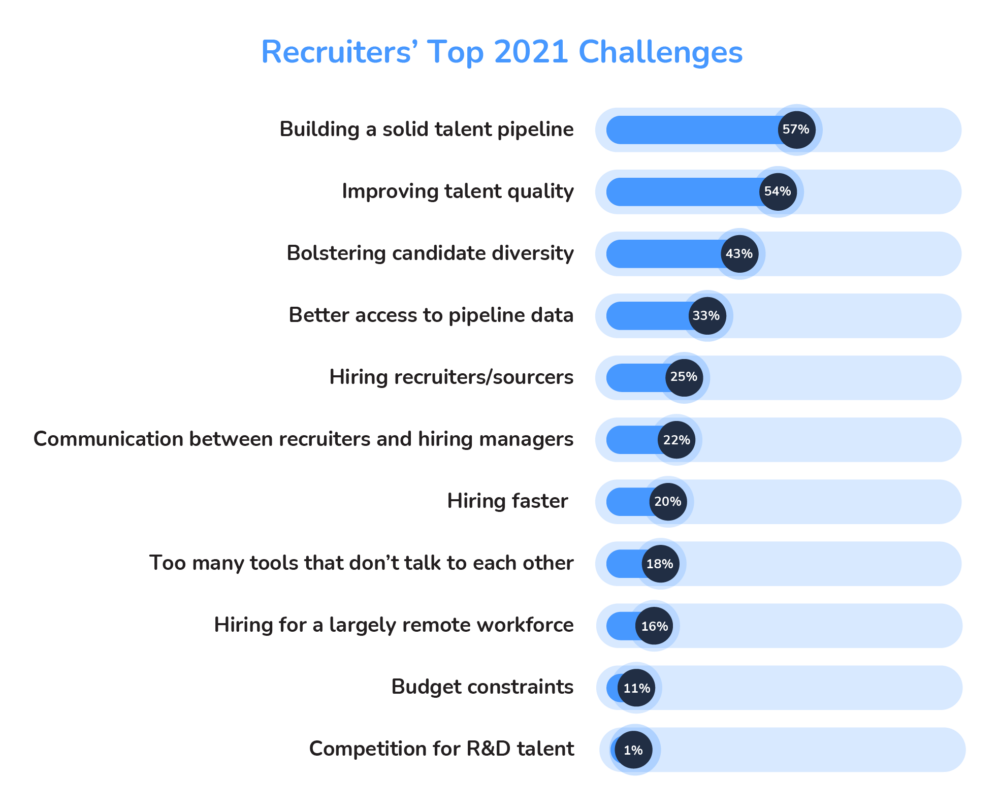The Recruiter Shortage — and 4 Other Challenges Facing HR Leaders Today

If you want to find out what’s on the minds of today’s HR leaders, the best thing to do is just ask them. That’s exactly what we did for our 2021 Findem recruiting study. We surveyed 100 high-level HR professionals from organizations of varying sizes, from under 50 employees to more than 1,000, to understand the most pressing challenges facing HR leaders today.
Before we get into the obstacles, however, there is good news. Survey participants report that recruitment budgets and technology tools are on the rebound this year as HR leaders recover from 2021 cutbacks. Our study found 73 percent of HR leaders have upped their recruiting budgets in 2021, with 41 percent seeing at least a 10 percent increase.
Now, onto the challenges HR leaders must tackle with those budgets:
1. Building a Reliable Talent Pipeline
HR’s biggest recruiting challenge is building a solid pipeline, which 57 percent of respondents cited as a top concern.
Building a pipeline of skilled, qualified candidates is always difficult, but it’s particularly hard in today’s competitive talent market. Employers are battling a talent shortage, and many of the best candidates aren’t actively hunting for jobs. As a result, 74 percent of recruitment teams have increased their outreach to passive candidates in the past year, according to our research.
This is an area where those increased recruitment budgets might come in handy: Automated candidate outreach tools can give HR teams a competitive edge in finding and engaging with passive talent.
2. Improving Talent Quality
The size of your talent pipeline means little if the candidates within it lack the skills and qualities you need. In fact, having too many applicants can be too much of a good thing, as it may take your team days just to sort through your candidate pool and identify the ones who might be a fit for your role.
So, in addition to building reliable talent pipelines, HR leaders are also preoccupied with improving the quality of the talent in their pipelines. Nearly three-quarters of the HR professionals we surveyed reported that they want to improve their ability to precisely identify candidates who match their open roles.

3. Bolstering Candidate Diversity
Increasing candidate diversity remains a serious challenge for many employers, and 43 percent of the HR leaders we surveyed named improving diversity as one of their top challenges right now.
What was striking, however, was the fact that eliminating bias ranked last on the list of HR leaders’ priorities — even though this tactic can be a key component in attracting and hiring more diverse talent. If HR teams want to improve diversity in their pipelines, they’ll need to take data-driven approaches to sourcing and regularly audit their hiring processes to see where they’re succeeding and where they’re falling short.
4. Creating Cohesive Recruitment Technology Ecosystems
Fifty-seven percent of the HR leaders we surveyed report they have adopted new tech tools in the past year. Of those who did increase the size of their tech stacks, 47 percent added sourcing tools, 29 percent added outreach and engagement tools, 22 percent added recruitment marketing tools, and 21 percent added tools for screening and assessment.
Interestingly, alongside this uptick in tool adoption, one-quarter of respondents also admitted they are dealing with a large number of tools that don’t “talk to each other.” Forty-five percent of respondents have 5-9 tools just in their recruitment tech stacks, and 24 percent have 10 or more; some even have 15-20 tools in their arsenals!
One way to tackle this challenge is to regularly check for efficiency gaps in your recruitment process. This can help you identify tools that aren’t quite working within your stack and create the most effective combination possible.
5. Hiring Recruiters
It’s more than a little ironic, but those tasked with recruiting talent face their own staffing problems. A quarter of the HR leaders we surveyed reported they’re finding it hard to fill open roles for sourcers and recruiters on their teams.
Recruitment teams are under intense pressure right now, given the dearth of freely available talent in the market. Not having a fully staffed recruiting team makes it all the more difficult to find candidates who fit. No wonder only 14 percent of the HR leaders we surveyed reached 100 percent of their hiring goals last year.
A lack of recruiters is a particularly troubling problem to have, as it can affect the operations of the rest of the organization. HR leaders should be giving this challenge as much attention as they can right now.
—
According to the people we surveyed, these five challenges are the things keeping HR leaders up at night these days. Tackling these challenges will require a more focused recruitment strategy, paying special attention to how technology can help HR and recruitment professionals solve their most pressing problems.
Hari Kolam is the CEO at Findem.
Get the top recruiting news and insights delivered to your inbox every week. Sign up for the Recruiter Today newsletter.

